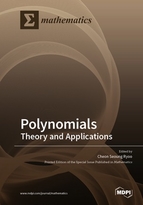Polynomials: Theory and Applications
A special issue of Mathematics (ISSN 2227-7390). This special issue belongs to the section "Difference and Differential Equations".
Deadline for manuscript submissions: closed (29 February 2020) | Viewed by 27527
Special Issue Editor
Interests: numerical verification method; scientific computing; differential equations; dynamical systems; quantum calculus and special functions
Special Issues, Collections and Topics in MDPI journals
Special Issue Information
Dear Colleagues,
The importance of polynomials in the interdisciplinary field of mathematics, engineering, and science is well known. Over the past several decades, research on polynomials has been conducted extensively in many disciplines.
This Special Issue welcomes all research papers related to polynomials in mathematics, science, and industry.
Potential topics include but are not limited to the following:
- The modern umbral calculus (binomial, Appell, and Sheffer polynomial sequences)
- Orthogonal polynomials, matrix orthogonal polynomials, multiple orthogonal polynomials
- Matrix and determinant approach to special polynomial sequences
- Applications of special polynomial sequences
- Number theory and special functions
- Asymptotic methods in orthogonal polynomials
- Fractional calculus and special functions
- Symbolic computations and special functions
- Applications of special functions to statistics, physical sciences, and engineering
Prof. Dr. Cheon-Seoung Ryoo
Guest Editor
Manuscript Submission Information
Manuscripts should be submitted online at www.mdpi.com by registering and logging in to this website. Once you are registered, click here to go to the submission form. Manuscripts can be submitted until the deadline. All submissions that pass pre-check are peer-reviewed. Accepted papers will be published continuously in the journal (as soon as accepted) and will be listed together on the special issue website. Research articles, review articles as well as short communications are invited. For planned papers, a title and short abstract (about 100 words) can be sent to the Editorial Office for announcement on this website.
Submitted manuscripts should not have been published previously, nor be under consideration for publication elsewhere (except conference proceedings papers). All manuscripts are thoroughly refereed through a single-blind peer-review process. A guide for authors and other relevant information for submission of manuscripts is available on the Instructions for Authors page. Mathematics is an international peer-reviewed open access semimonthly journal published by MDPI.
Please visit the Instructions for Authors page before submitting a manuscript. The Article Processing Charge (APC) for publication in this open access journal is 2600 CHF (Swiss Francs). Submitted papers should be well formatted and use good English. Authors may use MDPI's English editing service prior to publication or during author revisions.
Keywords
- umbral calculus
- orthogonal polynomials, matrix orthogonal polynomials
- special polynomial sequences
- applications of special polynomial sequences
- number theory and special functions
- fractional calculus and special functions
- symbolic computations and special functions
- applications of special functions to statistics, physical sciences, and engineering






